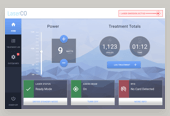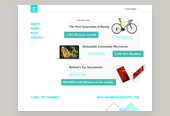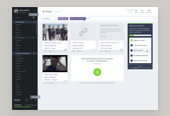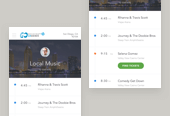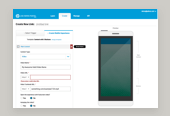My notes from selected sessions of SXSW Interactive, 2014.
Contents:
- Show Your Work!
- Make Yourself BIG: How the Body Shapes the Mind
- Why It Pays Not to Rush the Process of Innovation
- A Virtual Conversation with Julian Assange
- A Conversation with Dr. Neil deGrasse Tyson
- When to Pivot: A 163-Year-Old Company’s Evolution
- The Maker Age: Enlightened Views on Science & Art
- The UX of Real Time Site Personalization
- Design Pattern Libraries
- Is Bitcoin the Future of Money?
- Here’s a Secret: We Need Anonymous Social Networks
- A Global Economy Driven by Platforms and API’s
- Bitcoin & Math Based Currencies: Road to $100 BN
Show Your Work!
by Austin KleonAustin Kleon was the keynote speaker on the first day of SXSW Interactive. I had already read his second book, Steal Like An Artist and was looking forward to hearing him speak in person. Austin did not disappoint and was able to really motivate the diverse crowd with his simple, yet inspiring thought. I've already added his new book to my Amazon.com cart and highly recommend anyone reading this to do the same. My notes:
- Conferences such as SXSW tend to have “vampires” and “human spam” in attendance.
- These are people to become aware of and avoid at all costs.
- "Vampires" suck you dry of your energy by focusing on themselves.
- "Human Spam" are people that are tireless proponents of their own agenda. They are focused on climbing social ladders and giving nothing back to those the "pass".
- There is a genius myth in our profession ,when in fact, creativity is a highly social and collaborative practice.
- The genius myth needs to be replaced by the scenius reality. Scenius is a whole scene of people behind great things.
- If you want to be a master, you must first be an apprentice.
- You don’t have to be a genius. There is as much honor in being a small part of a bigger thing.
- Shut up and listen. Watch what others are doing.
- Ask questions. Draw.
- Don’t hoard great inspiration. Share what you’re interested in.
- Give good credit to others.
- Think of others as collaborators, not competition.
- Teach what you know, even if you’re not an expert.
- Students always teach best, as they have learned most recently and been exactly where you are sitting.
- Learn from of others, document your process and share it with the next generation of learners.
- Look for voids in your creative circles. Fill these voids with your creative solutions and repeat the process. Stay creative.
- Keep those you envy close and learn from them.
- Don’t waste time looking for connections.
- Do cool shit, share it and connections will come to you naturally.
- Sharing is greater than networking.
- Dedicate yourself to a craft.
- Ask yourself: What are you building right now that is going to last?
- Contribute to others passions. Always be ready to jump at an opportunity.
Make Yourself BIG: How the Body Shapes the Mind
by Amy Cuddy, Harvard Business School- Change your body language to change your outcomes.
- Controlling your body language during an interaction takes far too much cognitive bandwidth. This will destine you for failure.
- You should instead change your body language to affect yourself. It’s the inside out approach.
- Posture matters, even when your aren’t thinking about it. Power poses are space occupying. The openness of your body stands for liberation, freedom, confidence.
- She refers to the New Zealand Rugby team's power chant that they display before every match.
- Powerless body language includes face touching or wrapping oneself up.
- Testosterone is correlated with leadership and confidence.
- Cortisol levels are correlated with stress and anxiety.
- Preparatory power poses. Sleeping positions have been studied and are shown to effect your testosterone/cortisol levels.
- The “starfish” sleeping post will bring you the most confidence during a day.
- Even if you sleep in other poses, it can be very helpful to "starfish" before exiting your bed. This resets you and prepares you for the day.
- Imagine yourself in power poses for two minutes. Or find a private space and perform the pose for two full minutes to get testosterone levels up.
- Your presence is what gives you power.
- Nonverbal presence allows you to connect authentically with yourself and become what you want.
- Poses include "the victor" - hands up, or "the superman" - hands to the sides.
- These poses are natural instincts in humans and can be seen performed by blind people and children who have never been taught or seen these poses themselves.
Why It Pays Not to Rush the Process of Innovation
by: Austin Carr, Boris Sofman and Matt Rogers- It took 18 months to create the first version of Nest.
- With a hardware product, you must deliver a seamless fine product.
- There always tends to be a tension between moving slow and fast, you need to strike a balance here.
- Anything that actually ships, in hardware, should be very polished and finalized. Do not test with your first users.
- Be prepared to throw away your work and explore new directions.
- You never build what you set out to build.
- Kickstarter is a marketing tool, not a funding platform.
- There is not much of a profit margin in hardware.
- You should set up google alerts for various keywords if you are developing a new product.
- Keep your product a secret, so it is newsworthy once you are ready to launch. Reporters will come to you if you have created something innovative.
- Fail slow. Fail internally, not with actual customers. We fail on our dime, on our time.
- Frame what you talk about with the public very consciously.
- Give your first customers incredible customer service, these first reviews of your product will effect all others.
- Reinvent unloved things.
- Be vicious about eliminating features to focus on the core experiences.
A Virtual Conversation with Julian Assange
by: Benjamin Palmer and Julian Assange- Daily life for Assange? “a bit like prison; obviously some prisoners have it worse…”
- Assange is concerned about the huge military spending of the US ~75% of all spending (85% if you include US allies).
- The NSA has grown to be a rogue agency - it has grown unfettered.
- NATO represents approximately 80% military spend vs. 4% Russia.
- The NSA has been sucking all this up (all our private conversations with family, lovers etc).
- Ability for government to collect data increasing faster than data creation.
- Julian says the amount of information our government collects on us doubles every 18 months.
- Government will soon reach capacity to collect all human data.
- The balance of power has shifted towards those who surveil and those who are surveilled.
- The public now understands that data is power.
- Emphasizing how the NSA's response to Snowden - the huge use of power to down planes etc - highlighted its importance.
- Are we moving into a new totalitarian world where surveillance is total?
- "We got lucky" - Assange talking about how they ended up with an opponent (the NSA) who had no PR machinery or expertise.
- 4 years ago the internet was a quite amateur space... but when you try to do anything at scale you run into the power of the state.
- Assange on totalitarian dystopia: Surveillance is total; no one can live outside the state.
- Assange believes Internet was “politically apathetic” until Wikileaks, which directly challenged the state.
- The most important transition in the last decade is how political the internet has become.
- Assange is concerned about the huge military spending of the US - 75% of all spending (85% if you include US allies).
- Assange is listing all of the US / UK activists and journalists who are in effective exile after aiding Snowden & others.
- There's an exodus of national security reporters - they have become a new kind of refugee.
- This communication that we're having right now is part of the communication revolution that wasn't otherwise there.
- But these "refugees" can continue working in an even more meaningful way without being terrified of arrest.
- Brazil trying to take control of ICANN from US to avoid surveillance by US.
- This communication that we're having right now is part of the comms revolution that wasn't otherwise there.
- Assange points to Germany and Brazil as new centers of national security reportage because of the great people who fled there.
- Assange talking about the birth of WikiLeaks "I've kind of been involved in this business for 20 years".
- "I exist in a situation which is the dream of a national security reporter" - no police can come in, essentially a no man.
- First battle in war with national security was Warsaw Pact nations attempt to control cryptography in the 90's.
- Assange saying cryptography can liberate activists, even if it enables some criminals.
- One of the best ways to achieve justice is to expose injustice.
- Systemic injustice must be documented.
- Guantanamo bay manuals revealed policies and procedures.
- Highlighting the fact that systematic injustice needs to be written down to be effective - and so is traceable.
- Asked if post-NSA the net will become constrained, as it is in China, Assange talks about new laws and regulations on their way.
- There has been a militarization of our civilian space - an occupation of our civilian space.
- According to Assange a penetration of internet is a militarization of human society.
- Now that human society has merged with the internet, laws of the internet now apply to human society.
- These agencies have budgets in the tens of billions.
- Normally when there's a political response someone is fired, budgets are cut etc - none of this happened with the NSA.
- It's not the case anymore that you can hide from the state, keep your head down.
- "The NSA has dirt on everyone" even President Obama.
- Obama could, in theory, move to disband the CIA, the NSA, but practically he does not.
- Arbitrary justice is arbitrary. Even General Patraeus was brought down - no one is exempt.
- In Assange's reality' there is no proper civilian oversight of state security apparatuses. they're basically invulnerable.
- We have a serious form of totalitarianism now. History proves more complex and egregious forms of totalitarianism will come.
- We are all part of "the state," whether we like it or not. We now have no choice but to attempt to manage the behavior of the state.
- Assange says that Facebook etc is a distraction from a "massive theft" from the general populous.
- "There is a new body politic that has been developing over the last years..." Assange alludes to a new resistance develop.
- Assange wants to reverse this process - instead of allowing organizations to suck up info, allow this data back into public space.
- Assange on Zuckerberg saying we're "post privacy" -- "That just feeds the revenue model."
- We are educating each other at a speed that is unprecedented.
- Assange says that Facebook etc is a distraction from a "massive theft" from the general populous.
- "I'm not going to give the alleged perpetrator the head's up over the alleged victims." -Assange on what he will release next.
- Assange is reluctant to hint at upcoming revelations, saying he doesn't want institutions to have a chance to prepare spin.
- Ukraine desires for independence was betrayed by orange revolution.
- Pro democracy in western Ukraine were most corrupt people in nation.
- Interesting juxtaposition between WikiLeaks and Facebook. Regardless, knowledge = power.
- Assange calls the events in Ukraine "predictable" given all the foreign intervention in Ukraine and the geo importance of Crimea.
- Assange predicts that Russia will retain control of Crimea, and that Western Ukraine will be propped up by West.
- Assange on Ukraine outcome: Russia will retain control of Crimea & Crimea will become autonomous.
- I find it hard to imagine that any reporter in the US could have done better or been braver than Greenwald.
- Even billionaires in US are not free of government power despite access to money, lawyers etc.
- What is going on is an unprecedented theft of wealth from the majority of the population to the people who already have power.
- Even Pierre Omidyar has found that, even with $8 billion, there is not true freedom within USA (not part of military system).
- Here is London there is a kind of class system that is quite distasteful.
- For Assange real lessons weren't about the geo-political pressure, they were about how people you should be able to trust react.
- Perhaps the most remarkable thing about Assange is how diffident and calm he is - this is not a raving activist.
- Less than 1% of Snowden material has been released.
- We are all living in a world we don't understand.
- What we were really living in was an illusion - in which the true nature of power is obscured by a fog.
- In the early days of Iraq war we were living in a fictitious world - true nature of human institutions obscured.
- Asked if he is afraid: "Well, I'm a normal person. People say I'm brave. In some ways I feel the fear more keenly."
A Conversation with Dr. Neil deGrasse Tyson
by: Christie Nicholson & Dr. Neil deGrasse Tyson- The good thing about science is that it's true whether or not you believe in it.
- To be scientifically literate is to know when someone is full of shit.
- The new “Cosmos” is going to air in 170 countries and 45 languages. Premieres tomorrow night on FOX.
- To feel knowledge alters your perspective on the world... helps you take ownership of that knowledge.
- The "job" of COSMOS: to learn, and say, "now I know and understand my place in the universe."
- "My personal definition of science literacy is how much do you still wonder about the world around you?"
- "When you explore, all those answers come for free"
- Did you have kids to not have a messy house? Encourage exploration.
- "I think a scientist is just a kid who never grew up".
- Let your kids play with the pots. Let them explore.
- If you think the price of college is expensive, try to cost of ignorance.
- Curiosity... is the essence of scientific literacy.
- "You kid will bang on pots and pans. This is an experiment in acoustics! Let her bang."
- Lessons need to be experienced firsthand.
- If you think the price of college is expensive, think of the cost of ignorance.
- Let a kid break an egg and discover what’s inside, it’s only a $0.20 lesson.
- Science class- learning facts. If you don't learn what it is, why it works, you're susceptible to pseudoscientific thinking.
- I'm not going to debate you on what you think is true, I'm going to have a conversion about what science is.
- “I just tweet stuff. There is no planning. It’s just stuff I was thinking anyway.”
- You can't just choose what is true and what isn't. That's not the way the world works, or how science works.
- Instead of 'believe', what if we said 'question' - deGrasse on the Macy's Thanksgiving Parade slogan.
- "We have the power of mind to probe whats there in the world".
- Believing blindly has consequences.
- An exoplanet is a planet that orbits a star outside the solar system.
- These people know what an exoplanet is. This is geek central right here.
- "There is no physics in The Number of Things" get over it Pluto lovers!
- DIS'd = dead in space. How nerds diss.
- Because of all of the exoplanet data, we can ask new questions- can start looking at systems, can start asking about life.
- Lack of scientific knowledge is sign of failure of educational system to even teach what science is - it’s not just facts.
- lowing my mind with figuring out how to tell if a planet supports life with the light fingerprint in combo with atmosphere.
- "Carbon is the slut of the periodic table" - Jon Stewart via deGrasse.
- Does life require liquid water? Maybe it just requires liquid? Maybe methane?
- Rivers of methane on Titan. We imagine life on Titan using methane. If true, idea of Goldilocks Zone needs to be revisited.
- The finger wags are epic - its like watching the swirling of the Milky Way in a planetarium.
- is pointing out flaws in an inflatable globe. They haven’t accounted for melting ice caps.
- You’ve been lied to by textbooks that have to squeeze the moon and the earth onto the same page.
- 20 inch earth, 5 inch mars. Moon is about 20 feet away, Mars is about at Town Lake from the Austin Convention Center.
- With a 20” Earth…that dude who jumped out of a perfectly good balloon would be about 2mm off the surface.
- The is so much to be actually impressed with in the universe, I don't want you to be confused by that which is not.
- We need to explore space because you know the dinosaurs would have if they could have.
- I don't want to be the laughingstock among the aliens because we were intelligent enough to have a space program.
- If the Dinosaurs had a space program, they would have deflected that asteroid.
- "The day you stop thinking about tomorrow, you stop innovating".
- Human skeletons will end up in museums of Earth’s next great species mocking us for not having the tech. to deflect astroid.
- Let’s be tackling huge challenges, not just the next app. Give attention to space exploration!
- Space exploration. Expensive, dangerous, can't quantify risk. Can't create capital evaluation in going to space first.
- Tyson: Don't just be thinking of the next app: Health, security, transportation, safety, energy need to be attended to also.
- Private industry cannot lead in those big problems, like space exploration.
- Frontier explorers weren't driven by private enterprise but by national interests, governments says.
- Rare earth elements. Space did a lot of filtering for you. Some steroids core of planets that broke apart.
- Capitalist demand for ROI prevents investment in space discovery.
- The first trillionaire in the world is going to be the person who first mines asteroids.
- Q&A: most frustratingly misunderstood science. Lots. Something heavy falls faster than light thing? Can DO that experiment.
- What must up must come down. No, that's because you're not throwing it hard enough!
- Frustration? When people don't think things through. And then he dropped his boot and the moon.
- Called out innovation for not addressing huge issues like energy, transportation, health.
- I wonder if we are smart enough to actually figure out the universe.
- We define ourselves as intelligent because, well, we came up as the test for that.
- If you found life on Europa, you’d have to call it European.
- I'm not here to shut you up. I'm here to teach you how science works.
- "Don't shut down deniers, make education better"
- "Be the teacher who was that teacher to you" on inspiring students in science and education.
- STAY CURIOUS. Break things. Be inspired by things. Empower yourself.
- I see the pendulum swinging back... it was fashionable to deny science in a big, audacious way. The tone has shifted.
- Don't have to be a scientist to embrace the methods and tools of that enterprise. Science is becoming mainstream.
- The geek culture is rising up. they don't fear science, they embrace it.
- Day you stop thinking about tomorrow is the day you stop innovating. Space exploration is a long-term investment.
- Science is becoming mainstream.
When to Pivot: A 163-Year-Old Company’s Evolution
by Dan Schulman- 3 in 4 startups today will fail.
- American Express considers themselves very different from many current Fortune 500 companies, who are still so young and new. But, they realize that they still must be innovative to stay on top.
- American Express as a company destroyed it sown internal businesses in order to pivot forward and give users what they needed.
- This creates better services for the users int he long run.
- American Express in the beginning pivoted it’s clientele to the very affluent men sector.
- At this point in the company, they see a new untapped market and are shifting strategy from exclusive to more inclusive.
- 2.5 billion people are living on the fringe of financial markets.
- These people pay huge fees and have to spend lots of time waiting in lines.
- Other banks have costly branches, so they are shifting to upscale clientele only, making this problem worse.
- American Express is untethered by costly branches, so are pivoting opposite this.
- It’s expensive to be poor when it comes to financial services.
- American Express UX teams walk in the shoes of these potential customers. No banks, try to cash a check.
- They have produced a documentary movie to outline the issues called the Spent Movie.
- financial exclusion needs to be fixed, technology is the solution.
- We need to start a movement.
The Maker Age: Enlightened Views on Science & Art
by Adam Savage- 1st problem: we see science + art as opposites of each other.
- 2nd problem - we see both science and art as separate from us.
- Problem: we see science and art as opposites, as separate from us, we don't try to understand if we think we can't.
- Art and science are drifting apart. once we believe we can't understand something we give up trying.
- Art and science should be getting closer to each other and closer to us.
- Ignorance =/= bliss.
- Conversation is culture. Be active in your culture. Ignorance does not equal bliss.
- We can choose to be passive or active participants in culture, but being active is better.
- Art we don't understand: art is only what we like - equally valid.
- I don't know much about art but I know what I like.
- Why do we see art and science as mutually exclusive of one another?
- Savage defines 'culture' as us discussing and interacting with art and science.
- The only wrong response to art is what you borrow from another. Letting others tell you what to think.
- Every generation feels the same thing about art: that everything has already been discovered.
- Savage says that our view of scientists is polarising. We see them either as holy imparters of wisdom or lowly nerds.
- We see art and science as separate from ourselves and topics we're unqualified to discuss.
- Adam Savage pontificates the myths of Art & Science. Getting beyond paradigms of Einstein, geeks, tortured souls.
- Science is for everyone.
- Once we believe we can't understand something we give up trying.
- More science than sports in schools.
- "I'm great at math, I am terrible with numbers".
- MythBusters does not stand by results but we do stand by our methodology of test & try, test &try again.
- Every time you change your joke based on the last response, you are practicing science.
- Mythbusters knows it's more entertainment than science but by being digestible it can have a greater educational impact.
- 12 yr old girl in Berkley did study on parking meters using stopwatch that led to California legislation.
- We have far more sports teams than science fairs and I hope that changes by the time I'm done here.
- Adam Savage is appealing to the SXSW crowd that ART and SCIENCE are NOT OPPOSITES.
- Equations are art inside a mathematician's brain.
- Developing hypotheses is a creative act
- Scientific method: 1. Come up with a question 2. Forma hypothesis 3. Design an experiment to test hypothesis.
- Science is the belief in the ignorance of experts.
- Science requires creativity.
- Art and science are how we converse about what we are doing.
- Nothing is beyond your understanding. Seriously.
- The worst thing you can do is adopt someone else's opinion about art.
- "Art and science are the twin engines driving us forward as a society".
- Science in our country could talk more about failure - failure is when you really learn stuff.
- Scientists can be better storytellers. Adam thinks scientists should discuss failure more openly to humanise it.
- Kids think science is like math, a mountain of things to memorize, but really math is a vast unexplored world.
- Our culture is hostile towards science, so often it's politicized. As a result we don't discuss importance of failure in science.
- Hats off to science teachers using their own money to run experiments in the classroom and dealing with children.
The UX of Real Time Site Personalization
by Jesse Friedman- Don't require users to do anything, and we can make the internet a better place.
- You can't ignore data. Know your analytics.
- Stop trying to make all content work for "majority" of users; just publish pieces of content that work for individuals.
- Sm as easy as from detecting phone or location.
- Realtime UX means the user doesn't have to do anything to obtain the benefit.
- Stop trying to make all content work for majority of users & publish pieces of content that work for individuals.
- Dynamic web environments.
- Websites, not apps.
- Remember users if they've visited your site before.
- Show a curated experience, intimate.
- JC Penny shopping example - default to the size of the customer.
- Opposite of the Snowden talk.
- Wants sites to keep cookies of your personal stats.
- Amazon does this well.
- Publish pieces of content that work for individuals vs. trying to make all content work for the majority of users.
- Friedman: why can't we use encrypted cookies to automagically personalize an experience? The tech is there.
- Show location, opening times, contact and booking info before any other content on a mobile.
- Serve contextual content based on user preferences, location and history. Know thy user.
- Show the right content to the right person where and when they want it. Automatically open the doors for users.
- We have to work much harder to provide the simplest experience.
- Focus on providing value.
- Friedman: why can’t we use encrypted cookies to automagically personalize an experience? The tech is there.
- Interesting dynamic web content idea: Home Depot delivering promos on site based on location & weather forecast.
- Online stores could generate homepage based on past purchases, current events, & location. Minimize clicks. Huge for ecommerce.
- It’s so easy to add features and build and build and build, and that will just ruin everything.
- Focus, simplicity, brevity. "I didn't have time to write a short letter, so I wrote a long one instead." Mark Twain.
- Focus on providing value. Don't change someone's site in real time just because you think you can.
- Show location, opening times, contact and booking info before any other content on a mobile.
- Google does thus with travel information.
- Google Now.
- Emergency alerts: sites should know my location and adapt. help me know if i’m safe and where safe is.
- Serve contextual content based on user preferences, location and history. Know thy user.
- Don't show a user something they already have. Move them up to the next level.
- Personalization is still seen as a + developer task, at least in WordPress world. Not so!
- Tools like GPS and cookies let us give users exactly what they want, when and where they need it.
- In a convention center or hospital what i want is a map that knows where i am & helps me get to where I'm going.
Design Pattern Libraries
by Brian Peppler and John Goff- A pattern is a reusable solution to a commonly occurring problem.
- Mentions of Yahoo Design Patterns library and Bootstrap
- Recommended: Ordering Disorder: Grid Principles for Web Design, by Khoi Vinh
- Pattern libraries bridge the gap between design and development.
- Design patterns helps communication between team members. Design Pattern Libraries.
- The core reason a for consistency in an organization.
- Become a pattern library master
- How do you scope a pattern library? Visual only or front end code as well?
- How to you share the pattern library? A static document or an interactive website.
- Designers and Developers work best when they're able to walk that bridge together.
- If you're asking yourself when to start building the design pattern library, it's already too late.
- You can only be successful if you involve the developer from the beginning, when creating design.
- A reusable solution to a commonly occurring problem."
- Variations are important in docs, don't get too strict.
- Uipatterns.ebay.com
- Design working with development iteratively. Buttons. Motions. Flows. All should work consistently in defined pattern
- libraries.
- Elements for building a pattern library: Naming, Description, When/Where to use, Rationale, Examples & Variations.
- It is better to show than tell.
- Showing > Telling
- Yahoo pattern library
- Mailchimp patter library
- Patterny.com
- Sales force-heroku
- Patterns.alistapart.com
- Idea - design some type of pattern library and publish for portfolio. Highly exciting skill in the design industry.
- Pea.rs
- Design patterns help bridge the gap between designers & developers. Notes on Design Patterns.
- Trying to stay up with competitors on features is not as important as a holistic experience.
- Translate this into lost sales or marketing speak to get this up the chain.
- Lingo - internal glossary tool at PayPal.
Is Bitcoin the Future of Money?
by Fred Ehrsam and Rolfe Winkler
- With Bitcoin, there is no need for a third party to complete transactions.
- Allows for a decentralized transfer of ownership.
- Block chin is the true open source item of importance.
- A network first and foremost.
- We are in the early days of the internet.
- Bitcoin is about the decentralized network, not the currency.
- Bitcoin is the first place where you don’t have a third party nor do you have to prove ownership.
- Bitcoin is an application on top of an open network that lets you transfer ownership.
- Ehrsam thinks they’ll have to create clearinghouses.
- Small dollar payments on the internet is a great use of bitcoin.
- Bitcoin is efficient, quick unlike banks that take days to verify funds.
- What are people using bitcoins for?...As currency for the most part, in cases where the transfer of $ is extremely inefficient.
- “The biggest sin of the internet is that there’s no native payment currency.
- Bitcoin is the first place where you don’t have a third party nor do you have to prove ownership.
- Bitcoin offers live stock exchange beyond purchase of just stock. Purchasing physical prods when exchange rate is in your favor.
- Bitcoin is enabling new behaviors.
- 2014 will be the year when a lot of big retail companies start accepting Bitcoin.
- Big merchants accepting Bitcoin: look to middle of this year says Ehrsam.
- Ehrsam confident that this will the year that mainstream retailers start accepting bitcoin. It makes economic sense.
- If you're operating low margin business online (think:retail) can reduce fraud & cc operating costs, no-brainer. #SXSW
- Co-founders mother is a big part of product development to ensure simplicity #BITFuture #SXSW
- Early tech adopters are excited because it's simply a better payment network. Inherently better, cheaper, faster.
- Traditional tech early adopters (aka Nerds) are primary users of Bitcoin right now. Anti-gov people are just more vocal.
- Does Bitcoin give users complete anonymity? @FEhrsam doesn’t really think to the degree some users think
- Advocates love that it enables the sharing of information in a way that doesn't require the traditional middlemen /platforms
- Traditional tech early adopters (aka Nerds) are primary users of Bitcoin right now. Anti-gov people are just more vocal.
- Can Bitcoin protect us from the man? @FEhrsam says the network can.
- Bitcoin is pseudo anonymous. It’s a myth that it’s anonymous in the way people tout it. The most transparent network.”
- Will Bitcoin be subject to gov monitoring? Network is such that everyone has visibility to transaction history, public.
- Credit cards were made for brick & mortar stores, not the internet.
- Erhsam, Coinbase: What would happen if cash was invented today? Law enforcement would be up in arms - like with Bitcoin.
- Credit cards bad in terms of security. It's not the right form factor for online. Bitcoin doesn't require sensitive info.
- Bitcoin is the most secure payment rail in transferring value over the internet.
- Credit cards were not made for the internet. Bitcoin doesn't create the same security issues.
- Nature selection going on in Bitcoin world. First generation companies failing due to security issues. Security improves.
- Storage of Bitcoin is a unique problem. Coinbase keeps 90% of funds in cold storage - unplugged from the internet.
- How does Coinbase do what mt gox didn't? Ehrsam says it's about cold storage. Mt gox had no internal checks and balances.
- Credit cards were not made for the internet – they were foreign and got bolted on. Bitcoin changes that.
- Coinbase's @FEhrsam says his percentage of net worth is < 5% in Bitcoin. His future net worth tied to Bitcoin's success.
- Credit cards were made for an analogue world, and just used in digital. Bitcoin is made for digital.
- Legit Bitcoin companies have 3rd party audits like Coinbase. Mt. Gox was commingling funds and not auditing transactions.
- Recommends cold storage of coin.
- What is coinbase working on? Improving the Bitcoin customer/user experience.
- Ehrsam: every day there are more Bitcoin transactions and those actions will keep decreasing fees more and more.
- Bitcoin is a nascent form of low-cost foreign exchange.
- Funny that critics are up in arms around the perceived anonymity of bitcoin, imagine if cash was invented today?
- The mother of the Silk Road creator just asked about how donations can be made using Bitcoin.
- Ross Ulbricht's mom just asked a question about using #bitcoin for fundraising-her son's legal defense fund is in bitcoin.
- Yes, I do pay income tax...
Here’s a Secret: We Need Anonymous Social Networks
by David Byttow and Josh Constine- Originally @getsecret was a messaging one-to-one messaging app.
- Why is anonymity important? We want to reduce the friction of people saying what they mean and feel.
- None of the anonymous places to post on the internet are beautiful (other than @getsecret)
- Removing identity means you aren't expecting anything back. You can be more honest
- It's really easy to communicate online; it's really hard to convey emotion.
- Benefits of anonymity: Say what you mean without identity -- put it out there and done. Words stand on their own.
- At the end of the day we all want to be understood. Communication AND emotion.
- Good ideas should be lifted up, regardless of status on a particular platform - normal folks with good thoughts should be heard.
- The point of Secret: getting celebrities and ordinary users to 'stop holding back,' says @davidbyttow.
- Secret only has two moderators; not seeing a lot of bullying or inappropriate content.
- Not mich bullying on secret, says co-founder. Of course, anonymity brings out the best in people as we know.
- Users have the power to self-moderate by flagging offensive posts.
- We don't have to be nice, but we should be kind. Interesting words from @davidbyttow.
- Has an algorithm it will slow your posts down to others if they aren't rated highly.
- Josh Constine says he's afraid of the bullying that will go down on @getsecret if/when it gets popular with young kids.
- Love that @gosecret is rooted in a belief that kindness & beauty will win over salaciousness & pettiness.
- Anonymity requires moderation and censorship to replace responsibility.
- Do you see more people sharing secrets or engaging in other peoples secrets and not sharing.
- Okay- so anonymity focuses meritocracy of content- but how does it impact false but well crafted content?
- Doxing means that you are revealing an anonymous persons' identity.
- Bullying/defamation: Posting about someone else using their real name is against Secret’s policy.
- Perhaps you can walk me through a scenario apart from me eating baloney nine times a day.
- How do you make money off an anonymous app?
- That's a good question. We're not really thinking about that right now.
- Posting about someone else using their real name is against Secret’s policy.
- Minimum viable community.
- Paid forward: @davidbyttow got some kind help from the crowd on evading the valuation question that @JoshConstine was pressing.
- Anonymous don't mean untraceable," A great lesson for EVERYONE about, well, everything.
- If he could do 1 thing over, he'd move away from the term "anonymous", says it's a loaded term
- Byttow says @getsecret is considering age limits to combat bullying.
A Global Economy Driven by Platforms and API’s
by Khris Loux and Werner Vogels- Create your core business services around things you do very well. Very specific things. Core dompetencies.
- Loo at your system and think about what is reusable.
- Get rid of the gatekeepers.
- Enable anyone to do anything online.
- Find something that currently has barriers and tear these down.
- Amazon looks at what is core to their company, then opens it up to other companies as a paid for API.
- Other companies like Hilton should do this, for example, with airbnb.
- Amazon pushes it's salespeople to save their customers money. Compensation structured around client savings.
- Combine knowledge / strengths of businesses by leveraging API's. You won't win in winner take all.
- Shed parts of your business by leveraging API's and focus on core services.
- Speaker is challenging that amazon is a monopoly in the industry
- Amazons @werner is protesting against being compared to Microsoft. But he sure looks powerful.
- Transparency will be paramount in this new digital age. It's your data, you should know how it's being used.
- Snowden's documents did not contain any references to Amazon according to @werner.
- Deconstruction.com
- "Building APIs is hard. You have to support them forever."
Bitcoin & Math Based Currencies: Road to $100 BN
by Constance Choi, Jeremy Liew and Tony Gallippi- It might be "super money" but @jeremysliew reminds us there is more speculation than purchase volume going on.
- California passes law to acknowledge bitcoin as money, will fed gov follow?
- Bitcoin is a super currency.
- There's no Fed that can devalue the value of Bitcoin.
- Third wave of bitcoin enthusiasts are about disrupting the payments industry and making a buck off of that.
- 2/3 of the world population cannot pay online with fiat, PayPal or credit cards
- Huge potential in thee commerce space.
- Average bitpay transaction size is over $500.
- Irreversible, so much more secure as an online currency
- Our financial system should enjoy the same revolution as ore industries because of the internet. Über and airbnb as examples of other industry revolutions.
- Credit cards were not designed for the Internet, is bitcoin commerce's way of finally catching up?
- “I see bitcoin as Napster [of digital currency]
- Bitcoin helps consumers avoid fraud & identity theft, bc bitcoin wallets, exchanges, & even value are so secure?
- Bitcoin is volatile, like an early stage startup.
- Kraken - proper on boarding process for increased stability. Safety built in for the last two years.
- Technical infrastructure with strong legal tams working with regulators. Stable services are the goal and becoming the Norm in the industry.
- Making bitcoin related companies more reliable & "trustworthy" is great (with or without regulation), but ignores the main adoption problem.
- How can we get mass adoption of BTC? Media is backwards looking. Trust development community as they are forward looking. GitHub projects around BTC more than double that of stripe and PayPal.
- How do we teach people cold storage and private keys? Imagine a world in which everything was physical cash. Only carry around what you need daily. Safe at your house. Armed guard with vault with life savings.
- Multi sig is possible solution to safe storage of your BTC private keys.
- How soon line retailers accept bitcoin payments. Answer: Now with bit pay.
- Banks don't like bitcoin, how are we going to change this?
- Right now bitcoin still reloads on traditional banks.were not there yet, people still need to translate coin to fiat for rent bills etc.
- Solving problem of bank hate is up to users to adopt it and grow the hoc system. Need to prove confidence in the market. Answer: Just wait.
- Exceeding other payment processing companies at a rapid rate, it can't be ignored much longer. Keep submitting your app to the App Store, keep trying, keep it up.
- Asa consumer, what is the benefit for me? There are benefits. With credit cards, you are trusting every company to store and secure your personal information. Identity protection.
- Exchanging currency nationwide is benefit.
- Consumer protections? There are some third party services that offer arbitrator services. Escrow.
- There is a public record of every transaction. Block chain will win out over Coinbase type services.
Published by: Ray in Presentation Notes, Thoughts
